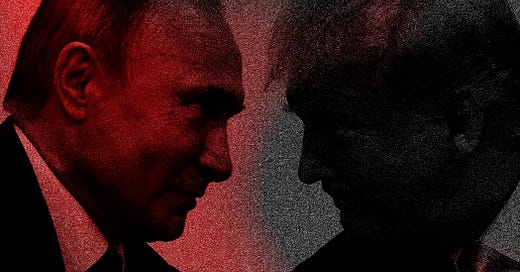
DONALD TRUMP’S TUESDAY PHONE CALL with Vladimir Putin to discuss a proposed thirty-day ceasefire in Ukraine, presumably as a step toward a peace deal, was pre-announced with great fanfare. But the actual conversation achieved next to nothing. Or perhaps worse than nothing if it sets the stage for a new round of Trump administration pressure on Ukraine—possibly including another cutoff of military aid and intelligence-sharing.
The White House readout of the nearly two-hour-long call portrayed a success: a peace initiative starting with an “energy and infrastructure ceasefire” as well as negotiations on a maritime ceasefire in the Black Sea with an eventual view to “full ceasefire, and permanent peace.” The statement ended on a hopeful note about the beginning of a beautiful friendship—make that “an improved bilateral relationship between the United States and Russia.”
The far more detailed Kremlin statement mentioned two apparent concrete steps: a prisoner exchange and an alleged order from Putin to stop strikes on Ukrainian energy infrastructure. (Also, plans for joint Russian-American hockey games.) But it also included a list of demands and conditions, such as a halt to mobilization in Ukraine and “a complete cessation of providing Kiev with foreign military aid and intelligence.” It reiterated Putin’s earlier charges that Ukrainian troops had committed “barbaric acts of terrorism” against civilians in the Kursk region (and referred to those fighters as boyeviki, “militants”). There was more talk about the mythical encircled Ukrainian soldiers in the Kursk region and Putin’s super-generous offer to spare their lives and treat them well (i.e., to refrain from war crimes) if they surrender. And there was also a swipe at “the untrustworthiness of the Kiev regime which has repeatedly sabotaged and violated negotiated agreements.”1 Classic Kremlin-style projection aside, let’s not forget that less than three weeks ago, Trump got really, really mad at Volodymyr Zelensky for (rightly) making the same point about Putin.
How should Putin’s proposed prisoner swap and very limited ceasefire be seen? The swap, which involves 175 people on each side, with the additional release of “23 heavily wounded Ukrainian servicemen” currently held in medical facilities in Russia, is certainly a welcome step—but it’s hardly a breakthrough, since such exchanges have already happened many times since the start of the war.
As for the limited ceasefire: First of all, it’s far more limited than Trump apparently believes, since the Kremlin version mentions halting strikes on “energy infrastructure” rather than “energy and infrastructure.”
Second, as a number of commentators including Garry Kasparov have pointed out, it is primarily in Russia’s interest, since Ukrainian strikes at Russian oil production facilities—of which there have been several in just the last few days—have been doing tangible damage.
And third, there is every reason to believe that Russia will not abide even by this ceasefire: It can always carry on as before and brazenly deny targeting Ukrainian energy facilities. Indeed, Ukrainian media have reported that an infrastructure strike on Slovyansk left a portion the city without power no more than an hour after Putin’s alleged order calling off such strikes. (Ukraine reportedly followed with a drone strike on an oil depot in Russia’s Krasnodar region, suggesting that at the moment the partial ceasefire is not even close to implementation.) Russian forces also unleashed a barrage of missiles and drones on eight or nine Ukrainian cities, with a hospital reportedly targeted in one of them. Hardly a gesture of Russian goodwill following the Trump-Putin conversation.
MANY QUESTIONS REMAIN UNANSWERED. For instance, while the Kremlin readout on the phone call stresses an end to military and intelligence assistance to Ukraine, Trump told Fox News host Laura Ingraham on Tuesday that Putin made no such demands and “actually we didn’t talk about aid at all.” Was something lost in translation? Did Trump have a senior moment? Did the Kremlin lie? All three scenarios are plausible.
The main conclusions to be drawn from the phone call, most independent Russian and Ukrainian commentators agree, are that (1) Putin does not want either a ceasefire or peace and is simply dressing up his “No” as a “Yes, but”; and (2) Trump has no intention of pressuring Putin. Putin’s likely intent is to draw out the charade for as long as he can—among other things, no doubt, by making an issue of supposed Ukrainian atrocities against civilians in the Kursk region. New School professor Nina Khrushcheva described Putin’s tactic as a game of “pushmi-pullyu”; the problem is, Trump doesn’t seem interested in doing much pushing.
On some level, the Trump-Putin conversation hands Putin a victory simply by treating him as an equal negotiating partner to the president of the United States. But this partnership is not only a gift to Putin, who has always craved Western acceptance even as he fulminated against the West; it is also an ego boost for Trump, who is easily seduced by the vision of himself and Putin as two great leaders carving up the world. Don’t expect him to take umbrage at Putin’s “disrespect”—evident in his de facto rejection of Trump’s peace plan, in his disparagement of the Ukrainian government with which the U.S. ostensibly partners in making the thirty-day ceasefire offer, and even in the fact that he made Trump wait for the phone call and laughed about it at a Russian business conference.
Whether Trump will go back to bullying Ukraine in an attempt to get it yield to Putin’s demands—and perhaps even try to pressure other Western countries to cut off weapons supplies and intelligence-sharing in order to achieve the elusive full ceasefire—remains to be seen. But this is a time for Ukraine supporters in the United States and in the rest of the free world to stand firm against any push for a “peace” that amounts to Ukraine’s capitulation.
The English translation on the Kremlin website uses “intractability”; the Russian word nedogovorosposobnost means something like “incapacity or unfitness to make meaningful agreements.”
















